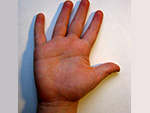Lheq’á:tses is the Halq’eméylem word for ‘five’. You will use special ending when counting certain things (people, trees, paddles, and others), but lheqá:tses is the general term for ‘five’ …
Pronunciation
- Lheq’á:tses sounds like luh-KAT-siss, except that the first l is hissy (lh), and instead of a k you say the Halq’eméylem q sound, with a pop.
- To make a hissy-l, you make a regular l but with more friction, and no vibration in the throat.
- To make the Halq’eméylem q, you touch your tongue back to your uvula.
- To make a popped consonant, you combine the sound with a catch in the throat (glottal stop).
Audio: Elizabeth Herrling, Elizabeth Phillips
Counting Five for Specific Objects
There are special ways of counting ‘five’, usually with a special ending, for specific objects. For example:
- lhq’átsále – five people (The ending –ale appears on many numbers for counting people.)
- lhq’atsesálhp – five trees (The ending –lhp appears on many words related to trees.)
- lhq’atssámets’ – five poles, threads, sticks, or poles (The ending –ámets’ appears on many words related to long skinny things.)
The ‘wide-hand’ connection
The base for lheq’á:tses (and the related words for counting specific objects) appears to be a root that looks like this: lheq’á.
Lheq’á doesn’t appear as a word by itself, but it (or similar forms) appear in many words for ‘wide‘ things. For example:
- lheq’tò:ls – wide forehead, have a wide forhead (The –ols ending appears on many words related to things with a spherical shape.)
- lhq’ó:tes – wide face, have a wide face (The –es or –os ending appears on many words related to the face, cf. sp’oq’es.)
- lheq’tíwel – wide rump, have a wide rump (The –iwel ending appears on many words related to the rump.)
The –tses ending appears on many words related to the hand. Literally, then, lheq’á:tses appears to come from ‘wide hand‘ or ‘have a wide hand‘—perhaps because when you count on your fingers, your hand is wide for the ‘five’.



No comments yet.